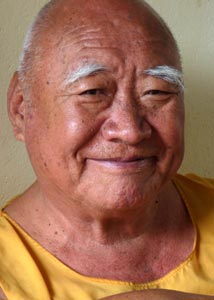Name: Tashi Gyaltsen
(Alias: No)
Gender: Male
Interview Age: 78
Date of Birth: 1932
Birthplace: Tsakhalowa, Kham, Tibet
Year Left Tibet: 1959
Profession: Monk
Monk/Nun: Currently
Political Prisoner: No

Interview No.: 69M
Date: 2010-04-10
Language: Tibetan
Location: Doeguling Settlement, Mundgod, Karnataka, India
Categories: Culture and History
Keywords: business practices/livelihood, childhood memories, Chinese rule -- life under, Chushi Gangdrug guerrillas, Kham, monastic life, taxes
Summary:
Tashi Gyaltsen was born in Tsakhalowa village in the Ba region. He was 3 years old when three out of his five family members died due to a mysterious disease. His grandmother was the other survivor and she took care of him until she too succumbed to the disease. A monk relative found him two days later with the body of his grandmother. He was placed in the charge of a neighbor who was also a lone survivor of the illness until the age of 7. At the age of 7 Tashi Gyaltsen was admitted to the local Kandha Monastery and was taught to read and write by his uncle, a monk. He describes his life in the local monastery until he left for Drepung Monastery in Lhasa at age 15. He gives a vivid account of crossing the Mekong River by being tied onto bamboo contraption called a ding. Tashi Gyaltsen appreciated the educational opportunities now available to him at Drepung Monastery and learned how to debate. Tashi Gyaltsen served as an assistant to one of the monk business managers. He explains the system of collecting the harvest from villagers who farm the monasteries lands. When the Chinese occupied Lhasa they tried to restrict the number of monks and prompted Tashi Gyaltsen to join the Chushi Gangdrug [Defend Tibet Volunteer Force] in 1958.
Interview Team:
- Marcella Adamski (Interviewer)
- Tenzin Yangchen (Interpreter)
- Pema Tashi (Videographer)

